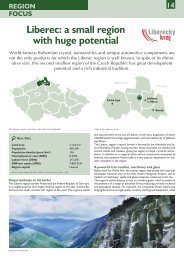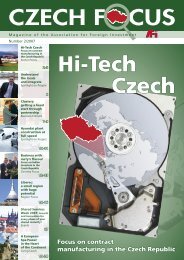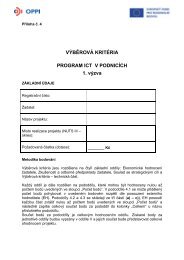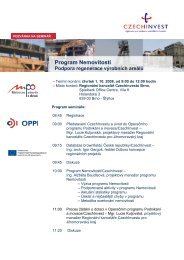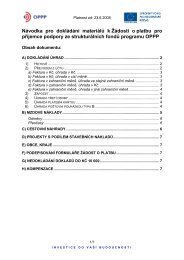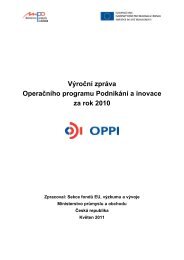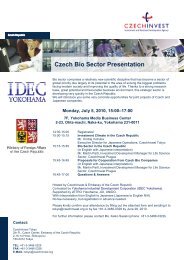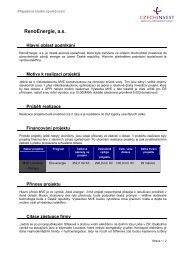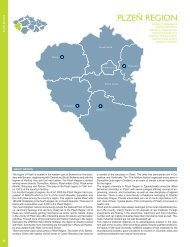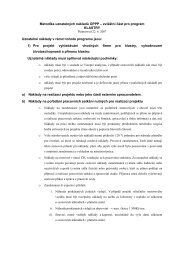Czech Focus 1/2006 - CzechInvest
Czech Focus 1/2006 - CzechInvest
Czech Focus 1/2006 - CzechInvest
You also want an ePaper? Increase the reach of your titles
YUMPU automatically turns print PDFs into web optimized ePapers that Google loves.
CZECH F CUS<br />
M a g a z i n e o f t h e A s s o c i a t i o n f o r F o r e i g n I n v e s t m e n t<br />
Volume 3. Number 1/<strong>2006</strong><br />
<strong>Czech</strong> Aerospace:<br />
Locked<br />
on target<br />
Sector <strong>Focus</strong><br />
Irish<br />
investment<br />
in the CR<br />
Country <strong>Focus</strong><br />
2-3<br />
Locked<br />
Provisions of<br />
the new<br />
Labour Code<br />
Business Climate<br />
4-5<br />
on Target<br />
6<br />
Customs<br />
strategy<br />
Business Climate<br />
Ten years with<br />
the Association<br />
for Foreign<br />
Investment<br />
Events...<br />
7<br />
8<br />
<strong>Focus</strong> on <strong>Czech</strong> Aerospace
1<br />
INVESTOR’S<br />
CALENDAR<br />
■ INVESTOR’S CALENDAR<br />
May - June <strong>2006</strong><br />
May<br />
3. - 5. 5. <strong>2006</strong> EBACE <strong>2006</strong>, Trade Fair, Geneva, Switzerland<br />
3. - 7. 5. <strong>2006</strong> Metaltech Malaysia, Trade Fair,<br />
Kuala Lumpur, Malaysia<br />
4. - 5. 5. <strong>2006</strong> ICT Expo <strong>2006</strong>, Trade Fair, Dublin, Ireland<br />
9. 5. <strong>2006</strong> Doing Business in the <strong>Czech</strong> Republic,<br />
Investment Seminar, Antwerp, Belgium<br />
9. - 10. 5. <strong>2006</strong> Shared Services Week, Conference,<br />
Amsterdam, the Netherlands<br />
9. - 10. 5. <strong>2006</strong> Automobilforum, Conference, Stuttgart,<br />
Germany<br />
9. - 11. 5. <strong>2006</strong> Semicon Singapore, Trade Fair, Singapore<br />
15. - 16. 5. <strong>2006</strong> Outsourcing and Shared Services,<br />
Conference, Frankfurt, Germany<br />
15. - 17. 5. <strong>2006</strong> <strong>Czech</strong> Science and Technology Days,<br />
Conference, Prague, <strong>Czech</strong> Republic<br />
15. - 19. 5. <strong>2006</strong> MACH & Subcon, Trade Fair,<br />
Birmingham, UK<br />
22. 5. <strong>2006</strong> WSF Investment Seminar, Frankfurt,<br />
Germany<br />
June<br />
7. - 9. 6. <strong>2006</strong> La Baule, Conference, France<br />
14. - 16. 6. <strong>2006</strong> IDC IT Forum & Expo <strong>2006</strong>, Trade Fair,<br />
Boston, MA, USA<br />
19. - 22. 6. <strong>2006</strong> BioLogic Europe, Conference, Amsterdam,<br />
the Netherlands<br />
20. - 24. 6. <strong>2006</strong> METAV Dusseldorf, Trade Fair,<br />
Dusseldorf, Germany<br />
28. 6. <strong>2006</strong> Investment Seminar, Dusseldorf, Germany<br />
Dear readers,<br />
The AFI was established ten years ago with the mission of supporting<br />
the entry of foreign investors into the <strong>Czech</strong> Republic and<br />
providing them with professional services at a level comparable<br />
with the quality to which they were and are accustomed in their<br />
home countries.<br />
When the AFI was established in 1996, the <strong>Czech</strong> Republic,<br />
unlike Hungary and Poland, did not have any complete incentives<br />
system and in that year <strong>Czech</strong>Invest registered only six investors<br />
that took on the role of real pioneers by deciding to build their production<br />
plants on greenfields in our country. In 1999, upon launch<br />
of the incentives system, the number of projects rose to 24, in 2003<br />
to 64 and finally last year it reached a record 154 projects.<br />
Certainly, this success is not only due to the incentives. We can<br />
also list the country’s qualified and relatively inexpensive labour<br />
supply, geographical location, and stable democracy among the<br />
main advantages of the <strong>Czech</strong> Republic, although precise analysis<br />
of the importance of these individual factors is impossible.<br />
I believe the availability of timely and reliable support in service<br />
lines represented by the AFI has many times contributed to the<br />
decision of investors to put down roots in our country.<br />
<strong>Czech</strong>Invest has undergone fundamental development in the last<br />
ten years. After the intentionally narrow initial focus on foreign<br />
investments, today the task of the agency is to support entrepreneurial<br />
activities in the <strong>Czech</strong> Republic as a whole, which also<br />
includes supporting small and medium-sized enterprises under<br />
programs financed from the structural funds of the European<br />
Union. More recently, <strong>Czech</strong>Invest began developing programs<br />
for the support of industrial research & development.<br />
However, the extension of the operating range of the agency<br />
does not mean any withdrawal from the support of foreign<br />
investments. For regions with high unemployment rates, besides<br />
information technologies, software development and research<br />
& development activities, the <strong>Czech</strong> Republic will still need<br />
additional ”ordinary” factories such as the Hyundai plant.<br />
Our association clearly comprehends that the era of ever-increasing<br />
inflow of FDIs and inconsistent incentives once will have<br />
been a thing of the past. The order of the day is long-term stabilisation<br />
of investors in the <strong>Czech</strong> Republic. A simple, competitive<br />
tax system, clear legislation, productive educational system<br />
and support for science and research certainly rank among the<br />
economy´s cornerstones. If we do not actively assert these principles,<br />
the AFI will one day lose its raison d’etre, because not many<br />
foreign investors will remain here.<br />
Contact: Editorial Board of <strong>Czech</strong> <strong>Focus</strong><br />
Association for Foreign Investment, czechfocus@afi.cz<br />
Stepanska 11, 120 00 Prague 2, <strong>Czech</strong> Republic<br />
Published by the Association for Foreign<br />
Investment - AFI under the auspices of <strong>Czech</strong>Invest,<br />
the Investment and Business Development Agency<br />
of the Ministry of Industry and Trade.<br />
I wish, not only personally but also for all the others that<br />
have in the past ten years set to work<br />
in the AFI, that the association will,<br />
even in coming years, continue to have<br />
a clear mission and attain satisfaction from<br />
meaningful and well-done work.<br />
Martin Slaby<br />
Chairman of the Steering<br />
Committee of the AFI
SECTOR<br />
FOCUS<br />
<strong>Czech</strong> aerospace: Locked on target<br />
Returning to the vanguard of competitive innovation, the <strong>Czech</strong> aerospace industry<br />
is being successfully integrated into global value chains. Both traditional <strong>Czech</strong><br />
manufacturers and <strong>Czech</strong>-based international investors are currently participating<br />
in numerous multinational joint-projects.<br />
2<br />
EV-55 Outback is the new-generation aeroplane developed in the <strong>Czech</strong> Republic<br />
At present, pressure from the global business environment not only increases<br />
the necessity of improving useful parameters of final products in the aerospace<br />
industry, but it also heightens demand for a shorter and more effective development<br />
cycle for new components and systems. Demand is also growing for<br />
additional capacity for the production of precisely defined series of parts or sets<br />
according to the design documentation, and also for independently designed<br />
“work packages” according to the customers’ requirements. Aerospace companies<br />
seeking to better serve customers while optimizing cost-effectiveness find<br />
that their needs related to production, sourcing, MRO and R&D can be more<br />
competitively satisfied in the <strong>Czech</strong> Republic than elsewhere.<br />
International cooperative programs<br />
The country’s deep-rooted aerospace tradition is evident in the fact that thousands<br />
of <strong>Czech</strong> fighter jets, commuter passenger aircraft and sport airplanes<br />
have been designed, developed, manufactured and marketed around the world<br />
over the past decades. The main competitive advantage of the <strong>Czech</strong> Republic’s<br />
aerospace industry is currently its well-established position and positive evaluation<br />
from existing customers, especially with regard to high-quality and timely<br />
deliveries for competitive prices. Substantial resources in most <strong>Czech</strong> companies<br />
are allocated for international cooperation, especially in terms of the implementation<br />
of individual subprojects (work packages) for foreign customers.<br />
Cooperative programs are proving successful for numerous <strong>Czech</strong> companies,<br />
as they employ the advantages of having a clear focus on key know-how by<br />
concentrating the resources on one central purpose while satisfying all customer<br />
requirements.<br />
The most significant role in the area of cooperative production in the <strong>Czech</strong><br />
Republic is played by Aero Vodochody, Letov and other, primarily engineering,<br />
firms such as Walter, PBS, Jihlavan, Strojcar, Frencken, SEKOedm, and Fimes.<br />
Great potential for <strong>Czech</strong> suppliers is represented by the expansion of activities<br />
especially in the supply chain of the EADS concern. Deliveries have also<br />
been realized or planned for Honeywell, S.A.B.C.A, Israel Aircraft Industries,<br />
Cyclone, Turkish Aircraft Industries, Vought Aircraft Industries, BAE Systems,<br />
Boeing, Piaggio Aero, SAAB, Rolls-Royce and others.<br />
Cutting-edge aerospace engineering<br />
Among the most significant and, by their volume, the largest programs in the<br />
medium-term view are the following joint-projects: the production program<br />
for the Sikorsky S-76C+ helicopter airframe which is partially equipped with<br />
systems produced by Aero Vodochody for the American company Sikorsky Aircraft<br />
Corporation; production of doors for Airbus, Eurocopter and Embraer<br />
aircraft by the company Letov (part of the Latécoère group); and design work<br />
performed by InterInformatics for Airbus Hamburg and Labinal.<br />
Trends of change in the <strong>Czech</strong> aerospace industry are especially apparent in<br />
the case of the company InterInformatics. The company got its start at the beginning<br />
of the 1990s as a distributor of CAD/CAM systems and a partner of<br />
the American company Computervision. Its first large order in the aerospace<br />
industry was realized in 1996 for the Ukrainian design office Antonov. After establishing<br />
a German subsidiary in 2000, InterInformatics began cooperation with<br />
the company AirCabin, which at that time had secured orders from Airbus in<br />
the area of aircraft interiors and was later taken over directly by Airbus. Today,<br />
InterInformatics is a top-level supplier to Airbus and has become an integral part<br />
of the Airbus design office in Hamburg.<br />
At the beginning, InterInformatics ensured for Airbus the transformation of existing<br />
2D documentation to complex 3D digital models of its aircraft. The aim was<br />
to increase Airbus’s flexibility towards customers and their requirements for additional<br />
changes to the interiors and equipment of the aircraft. Upon negotiating and<br />
approving the technical feasibility study, the relevant detailed design documentation<br />
must be processed within the shortest possible time, which is currently the<br />
main subject of contracts between InterInformatics and Airbus. InterInformatics is<br />
currently involved in the A380, A340, and A330 programs and is preparing cooperation<br />
in the A320 program. Airbus currently outsources its engineering services<br />
to the <strong>Czech</strong> Republic in the value of approximately EUR 14 million per year, while<br />
demand for these services is experiencing year-on-year growth. Among <strong>Czech</strong><br />
companies, InterInformatics is the dominant player in this area.<br />
Currently, there is worldwide growth in the demand for development and<br />
production of composite components. To a large extent, this trend can be attributed<br />
to the current activities of Boeing and Airbus, which are developing<br />
new-generation aircraft that make maximum use of composites. A pronounced<br />
shift away from classic riveted construction can be expected in the future. However,<br />
<strong>Czech</strong> companies are already prepared for these changes, which can be<br />
seen in Letov’s expansion into composite components (B787 program), as well<br />
as in the activities of companies such as LA Composite, Aero Vodochody and<br />
InterInformatics in this area.<br />
Another group of aviation manufacturers that take benefit from cooperation<br />
with <strong>Czech</strong> engineering companies is composed of top-level suppliers for leading<br />
aerospace producers, as well as manufacturers of light and mid-size aircraft<br />
facing a lack of internal design capacities. In this area, <strong>Czech</strong> companies such<br />
as Evektor apply their key know-how in the field of design and construction<br />
of aircraft. They are capable of providing structural analyses and processing of<br />
the results thereof, performance of aerodynamic analyses, geometric design and<br />
design of aircraft systems from the perspective of performance, stability and<br />
maneuverability, airframe design and optimization, as well as design of individual<br />
systems.<br />
The industry’s “ground support”<br />
In order to continuously improve the competitiveness of <strong>Czech</strong> aerospace suppliers,<br />
<strong>Czech</strong>Invest, the Investment and Business Development Agency of the<br />
<strong>Czech</strong> Republic, has been implementing a Supplier Development Program over<br />
the past five years. The program is designed to facilitate skills development of<br />
<strong>Czech</strong> suppliers to unlock their full potential by benchmarking them against<br />
world-class performance standards. Investment incentives for manufacturing,<br />
service, repair, design and R&D centers are also in place to complement the<br />
local investment climate, which is already conducive to profitability.<br />
What sets the <strong>Czech</strong> aerospace industry apart from others is that numerous<br />
<strong>Czech</strong> companies are able to offer comprehensive services within the overall<br />
framework of the supply chain: from design work, to prototype testing, series<br />
production and sales support. A range of <strong>Czech</strong> firms have EASA Production<br />
Organization Approval for production of civilian aerospace technology, and Design<br />
Organization Approval, which allows them to operate in the area of designing<br />
civilian aviation technology and which enhances their opportunities to<br />
participate in international production programs. It should be emphasized that<br />
there is also a very strong element of cooperation within the <strong>Czech</strong> aerospace
3<br />
SECTOR<br />
FOCUS<br />
components), Mesit Instruments (fuel-gauge system, de-icing system, regulation<br />
of ventilation and air conditioning), and Technometra Radotín (development and<br />
delivery of the undercarriage). Research laboratories also took an active part in<br />
development – the Institute of Aerospace Engineering at the Technical University<br />
in Brno, SVUM (National Research Institute for Materials), Nuclear Research<br />
Institute Rez and the Aeronautical Research and Test Institute in Prague. The cooperation<br />
between the individual members of the consortium is a key factor in<br />
the success of the project. The EV-55 Outback project’s scope and significance<br />
place it among the most important projects in the modern history of the <strong>Czech</strong><br />
aviation industry.<br />
A look at <strong>Czech</strong> space activities<br />
Surprisingly rich and successful are terms that best describe the <strong>Czech</strong> contribution<br />
to space exploration. This small country in the heart of Europe has achieved<br />
a long line of space firsts and today it is reaching for more.<br />
Aircraft monitoring system of <strong>Czech</strong> firm Speel PRAHA, s.r.o.<br />
cluster, in which well-established and respected producers of aerospace technology,<br />
in cooperation with new, engineering-oriented firms (InterInformatics,<br />
Evektor, Unis), are able to not only perform modernization of existing products,<br />
but can also implement completely new and complex projects for leading global<br />
companies.<br />
Many small charter operators, especially in the United States, are still using piston-driven<br />
twin-engine airplanes. Though excellent planes in their day, most of<br />
these are already technically obsolete and can no longer satisfy the ever-increasing<br />
demands for the comfort and safety of passengers, not to mention the fact<br />
that their production ended in the first half of the 1980s. Currently, there are<br />
no modern twin-engine airplanes on the market in the price range of up to USD<br />
2 million which would meet the needs of operators without cutting corners.<br />
New commercial airplane being<br />
developed in the <strong>Czech</strong> Republic<br />
An opportunity like this shouldn’t be missed, which is the reason why Evektor,<br />
with support from the Association of Aviation Manufacturers of the <strong>Czech</strong><br />
Republic, has decided to introduce the EV-55 Outback, a new-generation multipurpose<br />
airplane that combines the reliability and safety of a twin-engine plane<br />
with a high level of operational efficiency. The basic technical parameters are the<br />
result of an extensive marketing study conducted by Evektor in markets around<br />
the world with emphasis on the American market.<br />
A closer look<br />
From the very beginning, the EV-55 Outback was conceived as a replacement<br />
for aging twin-engine planes such as the Cessna 402, Cessna 404, and Piper<br />
Navajo/Chieftain, and as a safer and higher-performance alternative to current<br />
single-engine turboprop planes. With a maximum payload of 1,824 kg and the<br />
ability to carry 9-14 passengers a distance of up to 2,200 km at a cruising speed<br />
of 408 km/h, the Outback greatly outperforms its older and even current competition.<br />
Thanks to the use of the most modern software applications and the<br />
experience of the developers, the result is a very light yet sufficiently sturdy<br />
and durable airframe that allows operation under the most adverse conditions.<br />
A large amount of composite materials are used in the airplane’s construction,<br />
resulting in the lowest possible weight. The EV-55 Outback is able to operate<br />
from short airstrips and unpaved runways, as well as in extreme “hot & high”<br />
conditions. This great versatility is already being expanded with a float-seaplane<br />
version, making it possible to operate the Outback from the water. Another<br />
important criterion in the plane’s design is the ergonomics of the interior space.<br />
The cockpit is equipped with a modern integrated avionics system which, together<br />
with the ergonomic placement of the control elements, decreases the<br />
workload of the pilot and thus contributes to increased safety when in flight.<br />
Born of cooperation<br />
The scope of the project required the involvement of almost every <strong>Czech</strong><br />
aerospace producer from the very beginning of the Outback’s development.<br />
Evektor, the main developer and producer, was joined by, among others, Aero<br />
Vodochody (preparation of ground and flight trials, development support, design<br />
and production of assembly jigs), Avia Propeller (development and production<br />
of propellers), Jihlavan Jihlava (development and delivery of hydraulic<br />
Small nation, large contribution<br />
The first instruments with the “Made in <strong>Czech</strong>oslovakia” label were put to use<br />
in Earth orbit in 1969 aboard the Interkosmos-1 international scientific satellite,<br />
followed by more than two dozen <strong>Czech</strong> devices and systems launched into<br />
space in subsequent projects during the following decades. The country’s first<br />
own independent satellite – MAGION (short for MAGnetosphere and IONosphere)<br />
reached its orbit in October 1978. Until 1996, measurements carried<br />
out onboard four other Magion satellites contributed to a better understanding<br />
of the sun’s effect on the Earth’s climate and the propagation of electromagnetic<br />
waves. In 1978, the first non-Soviet and non-American citizen to enter space<br />
was a <strong>Czech</strong> astronaut.<br />
The number of successful <strong>Czech</strong> space activities grew with the automatically<br />
stabilized platforms on the Vega-1 and Vega-2 probes allowing accurate aiming<br />
to the studied object, which were key parts of the highly successful international<br />
robotic expeditions to Halley’s comet. The platforms were later adapted to carry<br />
Earth observation equipment on the Mir space station. Proven hardware was<br />
also the basis of the <strong>Czech</strong> MIMOSA satellite (2003) with the unique MACEK<br />
micro-accelerometer (previously flown onboard the American Space Shuttle Atlantis<br />
STS-79 in 1996) and the new-generation TITUS furnace for solid material<br />
preparation in a weightless environment.<br />
<strong>Czech</strong>s still onboard<br />
Modern space research in the<br />
<strong>Czech</strong> Republic continues the long<br />
tradition. The country’s relationship<br />
with the European Space Agency<br />
(ESA) entered a new phase in 2003<br />
when the <strong>Czech</strong> Republic became<br />
the second European Cooperating<br />
State (ECS) of ESA. The related<br />
agreement allows <strong>Czech</strong> research<br />
and industry organizations to actively<br />
participate in ESA projects under<br />
the Plan for ECS (PECS) program.<br />
At this time, eleven projects have been selected and are running with <strong>Czech</strong><br />
partners contributing either hardware and software development or satellite<br />
data processing to the ESA projects. PECS activities are currently managed on<br />
the <strong>Czech</strong> side by the <strong>Czech</strong> Space Office.<br />
At present, the <strong>Czech</strong> Republic is participating in the Galileo navigation satellite<br />
project and in several European scientific projects (Cluster II plasma monitoring<br />
mission, Demeter, SWARM, etc.). Innovative <strong>Czech</strong>-made solutions are also<br />
sought after oversees. In a NASA-funded project, the Gerstner Lab of the <strong>Czech</strong><br />
Technical University in cooperation with the Institute for Human and Machine<br />
Cognition of the University of West Florida developed an algorithm for highspeed<br />
root-cause failure detection in hydrogen production<br />
equipment, applying the latest agent-based decision-making<br />
technology. <strong>Czech</strong> space-related activities<br />
may not be driven by the space race of the titans, yet<br />
they are highly acknowledged by the international<br />
scientific community for their cutting-edge, creative<br />
contributions to the human cosmic endeavor.<br />
Robert Pilous,<br />
Investment Development Manager, <strong>Czech</strong>Invest<br />
(Sources: AAM, CSO, mentioned companies)
COUNTRY<br />
FOCUS<br />
Tigers in the snow<br />
4<br />
There are many similarities between Ireland and the <strong>Czech</strong> Republic.<br />
Leaving aside both countries’ shared passion for their national drinks, we share<br />
a similar history in many regards in that we have both struggled to free ourselves<br />
from the shadow of large and potentially dominating neighbours. Those who have spent<br />
some time in both countries also see a lot of similarity in the mentality of the people,<br />
particularly in their sense for humour.<br />
Another similarity is in the economic transformation of the countries. Ireland<br />
focused on foreign investment in the 1980s and early 1990s as a tool<br />
to help restructure its economy based on old industries (textiles, coal, steel)<br />
and agriculture. Thanks to the positive effects of foreign investment, Ireland<br />
has transformed itself from the country with the lowest GDP per capita in<br />
Europe to the one with the highest GDP per capita, in the process earning<br />
the nickname “Celtic tiger” for the rapid growth of its economy. The <strong>Czech</strong><br />
Republic has also successfully used foreign investment to stimulate rapid and<br />
far-reaching restructuring of its economy.<br />
Although the <strong>Czech</strong> lands can boast a longer and richer industrial tradition,<br />
much of that lead was lost during the forty years of the command economy<br />
and massive investments and know-how – both technological and managerial<br />
– were needed, a situation not dissimilar to that of Ireland in the early 1980s.<br />
A massive surge of inflow of foreign investment followed, first in the manufacturing<br />
industry and later in high-tech services – again much like in Ireland<br />
a decade earlier. When considering these similarities, it is no wonder that the<br />
<strong>Czech</strong> Republic has been a leading recipient of Irish investment in Central and<br />
Eastern Europe.<br />
Irish investment in the <strong>Czech</strong> Republic<br />
Considering the size of Ireland, Irish investment in the <strong>Czech</strong> Republic is surprisingly<br />
strong. While it is true Ireland does not appear on the list of top ten<br />
major investors in the <strong>Czech</strong> Republic, statistical data do not tell the whole<br />
story. More than 60 Irish companies currently have manufacturing or other<br />
facilities in the <strong>Czech</strong> Republic. Compare this with approximately 70 Swiss<br />
investors active in the country, or the estimated 450 British companies active<br />
in the <strong>Czech</strong> Republic, taking into account Britain´s population of 60 million.<br />
Selected Irish companies in the <strong>Czech</strong> Republic<br />
M WARD<br />
ARANTRONICS<br />
PRIME HIDE<br />
ASPEKT-KILCULLEN GRAFTON<br />
KINGSPAN<br />
QUINN GROUP PRAGUE<br />
C&F TOOLING<br />
LARGO FOODS M WARD<br />
E-TEL<br />
REALTIME TECHNOLOGIES<br />
NUVOTEM-TALEMA SILICON SYSTEMS & SOFTWARE<br />
IRE-TEX<br />
BARLO PLASTICS<br />
CONNAUGHT ELECTRONICS<br />
BRNO<br />
MERGON<br />
DII GROUP<br />
CLANCY RADIATORS<br />
One of the first-comers was the Irish entrepreneur Enda O´Coineen, whose<br />
company Kilcullen Kapital Partners operates nine businesses in the <strong>Czech</strong><br />
Republic today, ranging from real estate to software development. Other investments<br />
of the 1990s include Prime Hide, Barlo Plastics, and IRE-TEX.<br />
Another wave of Irish manufacturing investments started in 2000. C&F<br />
Tooling from County Galway set up manufacturing operations in the <strong>Czech</strong><br />
Republic in 2001 and employs nearly 100 in the production of metal cabinets<br />
and similar products in Velim.<br />
Mergon International<br />
established a facility in<br />
Brno in 2002 to produce<br />
technical blow-moulded<br />
components for the automotive,<br />
business equipment<br />
and power tool sectors.<br />
Connaught Electronics,<br />
a manufacturer of sophisticated<br />
electronic<br />
components for the automotive industry, recently completed its first foreign<br />
manufacturing branch near Humpolec. This investment will bring the<br />
Vysocina region some 300 new jobs, mainly for college-educated technicians<br />
and operators.<br />
Clancy Radiators is currently building a production hall in Veseli nad Moravou.<br />
Once completed, the plant will employ 50-100 in the manufacture and<br />
repair of radiators and radiator cores for tractors, buses and other motor<br />
vehicles.<br />
OMC Scientific is planning to open a facility for repair of semiconductor<br />
production equipment in Louny this year. The facility will employ 30–50 technicians.<br />
(note: the Irish company OMC was recently acquired by Williams<br />
Advanced Materials of the USA).<br />
Both Ireland and the <strong>Czech</strong> Republic are countries where potatoes are widely<br />
grown and consumed. It is thus not surprising that Largo Foods, which<br />
is perhaps better known under the brand names Perri Crisps and Hunky<br />
Dorry´s, chose the <strong>Czech</strong> Republic for their first investment abroad. The<br />
plant in Tremosna near Plzen has been successful and an expansion is being<br />
planned.<br />
The largest Irish manufacturing investor in the <strong>Czech</strong> Republic is Kingspan,<br />
one of the world´s largest manufacturers of insulation products and building<br />
components, which has had a manufacturing plant in Hradec Kralove<br />
since 1998.<br />
The largest Irish employer in the <strong>Czech</strong> Republic, however, must be the<br />
M. Ward Group, which employs more than 400 <strong>Czech</strong>s in contract<br />
manufacturing and logistics. The M. Ward Group brought a unique concept<br />
to the <strong>Czech</strong> Republic – so-called Sheltered Accommodation, a solution that<br />
offers companies a manufacturing presence in the <strong>Czech</strong> Republic without<br />
the need to invest. The companies can place their production machinery on<br />
the premises of the M. Ward Group near Most and the M. Ward Group will<br />
provide staff and take responsibility for production and delivery to customers.<br />
This concept allows companies to get started in the <strong>Czech</strong> Republic very<br />
quickly as well as to start on a small scale before they have won more contracts<br />
from <strong>Czech</strong>-based customers.<br />
Irish companies are not just manufacturing in the <strong>Czech</strong> Republic – many<br />
are engaged in research and development here. Silicon & Software<br />
Systems, the leading Irish integrated-circuit design house, has been in the<br />
<strong>Czech</strong> Republic since 1998, designing chips for electronics producers based<br />
all over Europe.
5<br />
COUNTRY<br />
FOCUS<br />
Realtime Technologies, a provider of electronic manufacturing services including<br />
prototyping, inspection, testing rework and certified training to the<br />
electronics industry, has added its site in Pardubice to existing facilities in<br />
Dublin and Sunnyvale, California. Alltracell Pharmaceuticals outsources<br />
the development of active pharmaceutical ingredients to several teams of<br />
<strong>Czech</strong> scientists.<br />
Several Irish companies are engaged in software development in the <strong>Czech</strong><br />
Republic. The list of such companies includes EuroCommerce, Key 6<br />
Solutions and CR2 among others.<br />
Many Irish investors are engaged in other services. The alternative operator<br />
E-Tel provides telecommunications and data services in the <strong>Czech</strong> Republic<br />
and five other Central European countries. Many <strong>Czech</strong>s listen to Radio Kiss<br />
98 FM, owned by an Irish investor.<br />
Prague was the site of the first overseas office of Grafton Recruitment,<br />
which today provides recruitment services in nearly 20 countries. Another<br />
Irish HR company, Sigmar Recruitment, took the same approach in 2005<br />
and opened its first office outside of Ireland in Prague.<br />
Given the amount of real estate<br />
development in Ireland in the<br />
past decade, it is not surprising<br />
that the Irish are very active on<br />
the <strong>Czech</strong> real estate market.<br />
Important commercial buildings<br />
including the Hilton Atrium<br />
Hotel, the Four Seasons Hotel,<br />
the Prague Stock Exchange<br />
building, Charles Square Centre<br />
and others are under Irish ownership. Ballymore Properties is undertaking<br />
a major residential development in the suburbs of Prague. Other Irish companies<br />
active on the <strong>Czech</strong> residential real estate market include the Quinn<br />
Group, the Red Group, Lexxus, Simply Mortgages and M&M Developments.<br />
Cooperation, not competition<br />
There has been discussion as to whether the admission of countries such as<br />
the <strong>Czech</strong> Republic into the European Union will mean competition for Irish<br />
businesses. The reality is that Ireland’s situation as an island located on the<br />
very western edge of the EU makes it difficult for some Irish businesses to<br />
compete with their continental rivals. The <strong>Czech</strong> Republic offers Irish companies<br />
the possibility to set up subsidiaries in the centre of continental Europe<br />
in order to supply customers who cannot be supplied efficiently directly from<br />
Ireland due to transport costs and/or time requirements.<br />
Rapidly expanding markets in Central and Eastern Europe offer Irish companies<br />
numerous opportunities. Travel is more convenient than ever before<br />
as there are direct flights to Prague from Dublin, Cork and Belfast and there<br />
are no barriers to trade, investment and movement of labour. With the experience<br />
gained in their fast–growing home market, Irish companies hold an<br />
advantage in the <strong>Czech</strong> Republic, which in many ways resembles Ireland of<br />
only a few years ago.<br />
Rene Samek, Director<br />
Investment and Applied Research Division<br />
<strong>Czech</strong>Invest<br />
Irish investors in the <strong>Czech</strong> Republic<br />
company<br />
Manufacturing<br />
Kingspan Group<br />
M Ward Manufacturing<br />
Nuvotem-Talema<br />
Barlo Plastics<br />
Connaught Electronics<br />
C&F Tooling<br />
Mergon<br />
Largo Foods/Perri Crisps<br />
IRE-TEX<br />
Arantronics TEO<br />
Prime Hide<br />
Realtime Technologies<br />
ELC Laser<br />
Services *<br />
E-Tel<br />
Grafton Recruitment<br />
Radio Kiss<br />
Silicon & Software Systems<br />
Aspekt Kilcullen<br />
EuroCommerce<br />
sector<br />
Building materials<br />
Electronics/plastics/assembly<br />
Toroidal transformers<br />
Plastics<br />
Electronics<br />
Metal cabinets for telecoms<br />
Plastics<br />
Food – potato crisps<br />
Textiles<br />
Cable assembly<br />
Leather<br />
Electronics<br />
Precision engineering<br />
Telecommunications<br />
Recruitment<br />
Radio<br />
Design of chips for electronics<br />
Information services<br />
* retail, leisure, consulting services and real estate not included<br />
Software development<br />
<strong>Czech</strong>-Irish connections – did you know that ....<br />
• Irish Franciscan monks set up a monastery in Prague in the 17th century.<br />
The street on which the monastery was situated is still called Hybernska<br />
to this day, which comes from Hibernia, the Latin name for Ireland.<br />
• Legend has it that the Irish Franciscans also introduced the potato to the<br />
<strong>Czech</strong> lands. The potato has been a staple food in both countries ever<br />
since.<br />
• The <strong>Czech</strong>s introduced modern production methods into the sugarprocessing<br />
industry in Carlow, Tuam, Mallow and Thurles in the 1920s and<br />
1930s.<br />
• After World War II, <strong>Czech</strong> craftsmen trained apprentices in the Waterford<br />
glassworks. Miroslav Havel of the <strong>Czech</strong> Republic was one such master<br />
craftsman who, during his 41 years of dedicated service with Waterford<br />
Crystal, created such famous cuts as Lismore, Colleen and Kildare.<br />
Useful contacts<br />
<strong>Czech</strong>Invest, London Office<br />
Hana Chlebna, Director of UK<br />
and Ireland Operations<br />
1 Harley Street, London W1G 9QD,<br />
Tel: +44 207 291 4610<br />
Email: london@czechinvest.org<br />
Embassy of the <strong>Czech</strong> Republic in Dublin<br />
57 Northumberland Road,<br />
Ballsbridge, Dublin 4<br />
Tel: +353 (0)1 668 1135<br />
Email: dublin@embassy.mzv.cz<br />
<strong>Czech</strong>Trade, Dublin office<br />
27 Upper Fitzwilliam Street, Dublin 2<br />
Tel: +353 (0)1 632 8625<br />
Email: info@czechtrade.ie<br />
www.czechtrade.ie<br />
Irish Embassy in Prague<br />
Enterprise Ireland, Prague office<br />
Trziste 13, 118 00 Prague 1<br />
Tel: +420 257 531 585<br />
Email: irishembassy@iol.cz<br />
<strong>Czech</strong>–Irish Business Association<br />
www.ciba.cz
BUSINESS<br />
CLIMATE<br />
6<br />
The New Labour Code<br />
and what it means for companies and investors<br />
The draft of the new Labour Code, which would come into force on 1 January 2007, is<br />
being discussed in the <strong>Czech</strong> Parliament. Its approval would end the long-running debate<br />
about its form. The current legislation has been valid for nearly 40 years and has been<br />
amended 47 times, as a result of which its level of transparency has suffered.<br />
is common in other areas of work: “what is not forbidden is permitted.” Though<br />
this seems to be a mere splitting of hairs, it has far-reaching impact. It will enable<br />
greater liberalisation of labour relations and greater scope for employees and employers<br />
to establish specific contractual conditions.<br />
Another new feature of the Labour Code is the introduction of the “work-time<br />
accounts” principle, which enables companies to flexibly react to changing requirements<br />
for labour corresponding to their production output. Work-time accounts<br />
can be instituted in organizations on the basis of internal regulations, or on the<br />
basis of collective agreements, which means that this principle can be established<br />
by employers where no trade unions are active. In practice, this means that if the<br />
employer has excess labour capacity in the course of a year, that employer can pay<br />
a constant wage so that in “work peaks” the working time will be longer and in the<br />
subsequent periods of lighter workloads, the employees will have more free time.<br />
illustrative photo<br />
The new Labour Code will henceforth be a reflection of the market economy and<br />
will create conditions for limiting the inherent equalitarianism among employees,<br />
which is a feature of the previous legislation.<br />
The new Labour Code is the most radical single change in 40 years and is part of<br />
a “package” covering not only employment legislation but also health and safety<br />
needs (both at work and outside the work environment) and various changes to<br />
other laws which are themselves linked to the Labour Code. It was originally intended<br />
to be linked to a major revision of the Civil Code, but the latter is now<br />
unlikely to be ready for some time, so the new Labour Code therefore makes<br />
reference to the existing Civil Code.<br />
One of the most important changes is the change of the principle of the Labour<br />
Code. Until now, the following held true: “what is not permitted is forbidden”.<br />
The new Labour Code reflects the opposite, more flexible principle, which<br />
These are some of the specific changes in the new Labour Code:<br />
• If an employee receives notice of termination due to long-term incapacitation<br />
resulting from illness, that employee shall be legally entitled to<br />
severance pay.<br />
• Provisions on discrimination and direct references to equal treatment will<br />
be transferred from the Labour Code to a new anti-discrimination law.<br />
• A new Act on Accident Insurance will cover work-related injuries and<br />
occupational health issues.<br />
• The administration of travel expenses and other recoverables will now<br />
be included in the Labour Code.<br />
• Changes in the definition of delivery of documents related to<br />
employment, including the use of e-mail, where previously only printed<br />
correspondence was acceptable.<br />
The Labour Code also introduces a general termination-notice period of<br />
two months. In cases when notice is given by the employer for specific reasons<br />
stated in Article 52 a), b) and c) – for example, relocation or shutting down<br />
of the employer’s business – there is a two-month notice period and the employee<br />
is entitled to three months’ severance pay. The current Labour Code<br />
regulates this as a three-month notice period plus two month’s severance pay in<br />
these cases. The elimination of the so-called offer obligation can be considered<br />
a positive aspect of the new Labour Code. This refers to the obligation of the<br />
employer to offer a different position to the employee who is being given notice<br />
of termination.<br />
The new Labour Code respects the present obligations and regulations of the<br />
European Community, which the <strong>Czech</strong> Republic must fulfil based on international<br />
agreements and membership in the European Union. The rights of employee<br />
representatives (trade unions, employee committees and representatives for the<br />
area of safety and protection of health at work) are preserved. The Labour Code<br />
should have approximately the same impact on the business environment of the<br />
<strong>Czech</strong> Republic as the current legislation and should not have any negative social<br />
impact.<br />
Stuart Roberts<br />
Alpha Management Consultants s.r.o.<br />
It is necessary to add that the association of employers would prefer<br />
an even more liberal form of the Labour Code. Employers are not<br />
satisfied with the following issues:<br />
• Employers would like to have a greater possibility to react flexibly to market<br />
conditions by adjusting the number and structure of employees with<br />
a shorter notice period.<br />
• Employers also criticise the preservation of the power of trade unions.<br />
If, however, we take into account that only 15.5% of all employees are<br />
organized in unions and that union membership has been falling over the<br />
longterm, this argument loses its strength.<br />
• The first 14 days of sick leave are paid by employers. Based on the experience<br />
of Slovakia, it can be supposed that this change will lower the rate of<br />
sickness as employers will have a personal interest in preventing illness among<br />
their employees.<br />
• There will be a wage increase for work at night and during weekends, and<br />
for stand-by regimes.
7<br />
BUSINESS<br />
CLIMATE<br />
Customs strategy prevents<br />
unwanted surprises<br />
It is obvious that investors coming to the <strong>Czech</strong> Republic concentrate<br />
their efforts on getting their business activities started as soon as possible.<br />
This task is not easy to handle in an unknown environment and<br />
usually requires the full attention of the management. As a consequence,<br />
proceedings and costs related to the export and import of goods are not<br />
priorities. Customs issues and costs are treated as inevitable obstacles<br />
that should be paid, tolerated and “resolved by outsourcing”. This common<br />
but unfortunate “solution” often brings serious difficulties that can<br />
remain dormant for years and once they become active again may be very<br />
unpleasant and costly.<br />
Customs planning saves<br />
time and money<br />
To avoid unwanted surprises it is recommended that more attention<br />
be devoted to customs planning at the beginning in order to save time,<br />
costs and nerves in the future. In most cases it is feasible to outsource<br />
the handling of customs formalities to a professional customs agent; however,<br />
when doing so the following principles should always be carefully<br />
considered. First, the world-wide experience of long-term cooperation<br />
with a multinational provider of customs services does not automatically<br />
guarantee that its local entity has the expected quality and experience.<br />
Verification of references, comparison of offers and an objective selection<br />
process should always be performed.<br />
Secondly, when selected, the customs agent should clearly understand<br />
his/her obligations and responsibilities. A plain and unambiguous definition<br />
of the scope of operations and responsibilities in a well-thoughtout<br />
contract is a crucial condition for effective outsourcing of handling<br />
customs formalities and related liability. Experience shows that customs<br />
agents mostly act on behalf of the trading company but the contract<br />
leaves all responsibility for the impacts of such acts on the trading company.<br />
Companies that engage the services of a customs agent are usually<br />
not aware of this important fact and live with the delusion that their liability<br />
has been transferred to the customs agent.<br />
illustrative photo<br />
use his/her expertise and experience for the benefit of the trading<br />
company. Proposing and implementing suitable customs procedures<br />
with positive economic impact, application of simplified procedures<br />
and similar authorisations, use of paperless communication methods<br />
whenever possible, searching for possible savings in customs duties and<br />
administrative costs, etc., should be commonplace. Unfortunately, this is<br />
still a rather rare phenomenon.<br />
How to uncover<br />
weak points<br />
“Trust but verify!” is the final but equally important recommendation.<br />
Periodic, or at least random, verification of the customs agent’s actions<br />
and the outcomes thereof can confirm that everything is running<br />
properly, uncover weak points, and also stimulate improvement and<br />
eliminate risks.<br />
The third recommendation is to demand more from customs agents.<br />
A professional firm should take responsibility for correct customs<br />
declarations, focusing mainly on factors influencing duties, such as<br />
classification, value and origin of goods. Furthermore, the customs agent<br />
should not only provide compliance procedures, but should also actively<br />
illustrative photo<br />
A regular customs review can either be provided by the company’s own<br />
experts or by third-party specialists. There is no doubt that prevention<br />
or timely correction of mistakes is always cheaper than the negative<br />
impacts of a post-clearance inspection carried out by customs authorities.<br />
Companies that have experienced the latter would certainly prefer to<br />
establish a customs strategy ahead of time. Fortunately, there is always<br />
time to realise that customs aspects of foreign trade offer a lot of room<br />
for improvement and savings opportunities and that such opportunities<br />
should be seized as soon as possible.<br />
illustrative photo<br />
Ivona Klabouchova<br />
Senior Manager, Tax Department, Deloitte <strong>Czech</strong> Republic
EVENTS...<br />
OR WHAT WE’VE FOUND OUT<br />
Ten Years with the AFI<br />
8<br />
On January 26 of this year roughly two hundred investors, AFI partners<br />
and members, <strong>Czech</strong>Invest managers and other guests celebrated the tenth<br />
anniversary of the Association for Foreign Investment (AFI).<br />
For over ten years, the AFI has assisted in the cultivation of the <strong>Czech</strong><br />
investment environment, providing support to <strong>Czech</strong>Invest in gaining foreign<br />
direct investments. A no less significant part of the AFI’s activities is<br />
the provision of related services to foreign investors in the <strong>Czech</strong> Republic,<br />
for which purpose are used the services of member companies, thus<br />
bringing them the possibility to not only realise their potential, but also<br />
opening the door to dialog with other AFI members, government institutions,<br />
etc.<br />
“The subject of this agreement is the founding of an association which<br />
through the effective cooperation of its members aids the development of<br />
the inflow of foreign investments into the <strong>Czech</strong> Republic while supporting<br />
the <strong>Czech</strong> business environment,“ states the AFI charter, which was<br />
signed on January 1, 1996, by the chairpersons of the nine founding companies<br />
and organizations: B.I.R.T., s.r.o. (B.I.R.T. Group), <strong>Czech</strong>Invest,<br />
Cheming, a.s., ICT Prague, s.r.o., Polytechna Consulting, a.s., Seddons,<br />
Squire, Sanders & Dempsey, Stepp, s.r.o. and Strojexport P.T.A., a.s.<br />
Martin Slaby (holding an auction gavel) has been the AFI’s chairman since November<br />
2005. During the auction of premium wines, he was successfully seconded by<br />
former <strong>Czech</strong>Invest spokeswoman Jana Viskova.<br />
Since 2001, a joint project of the AFI and <strong>Czech</strong>Invest called the Partnership<br />
Programme for the Support of Foreign Direct Investments in the<br />
<strong>Czech</strong> Republic has been in place. The partners of this programme are<br />
stable companies in the <strong>Czech</strong> market, which are not indifferent to the<br />
level of the local business environment and actively support the competitiveness<br />
and openness of the <strong>Czech</strong> economy. All partners deserve thanks<br />
for their current cooperation.<br />
For their long-term support, thanks also goes to all current and former<br />
members of the AFI, cooperating institutions and everyone who has in any<br />
way contributed to the AFI‘s activities.<br />
How to join the AFI<br />
Petr Chadraba<br />
Project Manager of the AFI<br />
Deputy Minister of Industry and Trade Robert Szurman was among the notable speakers<br />
kicking off the celebration of the tenth anniversary of the Association for Foreign<br />
Investment. Martin Jahn, the former Deputy Prime Minister for the Economy, gave<br />
a toast recalling the Association‘s past and expressing its hopes for the future.<br />
On the occasion of the AFI’s tenth-anniversary celebration, the Association‘s<br />
first chairman, Tomáš Ctibor, looked back on the beginning of the<br />
AFI’s activities, when Japanese investors travelled to view an overgrown<br />
cornfield that was presented to them as a business estate. His successor,<br />
J.A. Havelka, who held the post from 1999 to 2005, reminisced that the<br />
beginnings were not at all simple, as at that time support for foreign investments<br />
was not of great interest in the <strong>Czech</strong> Republic.<br />
One phase of the AFI’s existence has reached its peak, and the Association<br />
is well-prepared to face new challenges in the future. Under the<br />
leadership of its current chairman, Martin Slabý, the AFI will primarily<br />
concentrate on placing uncompromising emphasis on maintaining its highquality<br />
membership base, bringing the AFI and its members into constructive<br />
public discussions in order to administratively influence the economic<br />
environment of the <strong>Czech</strong> Republic, and other goals.<br />
Membership in the Association can be obtained by legal entities operating<br />
in the CR whose activities mostly consist in the provision of consultancy and<br />
other services (financial, legal, economic, information systems, etc.).<br />
Together with the application for admission, applicants for membership are<br />
required to present:<br />
• four letters of recommendation from current members of the Association<br />
• a current abstract from the Commercial Register or other register<br />
• an annual report, if the applicant is legally bound to publish one<br />
• bank statement on the applicant’s financial situation<br />
• references from two foreign or multinational clients for every main activity<br />
of the applicant<br />
• confirmation from the tax authority that the applicant does not have any<br />
outstanding tax obligations toward state authorities. The confirmation must<br />
not be older than three months.<br />
• abstract from the Register of Criminal Records, not older than three<br />
months, of the natural person authorized to act in the name of the company<br />
• a minimum of three years of experience in the field the company states as its<br />
main field of activity documented by an abstract from the Commercial<br />
Register or an analogous register (for example, the Bar Association)<br />
together with a written reference confirming the three years’ experience<br />
• document demonstrating ISO certification (if the applicant cites such<br />
certification)<br />
The application will be assessed by the AFI’s Steering Committee. Upon its<br />
approval, it will be presented to the General Assembly, where it will undergo<br />
final voting by all members of the Association.<br />
For more information, visit www.afi.cz
YOUR CZECH E-GUIDE<br />
■ The Official Travel Site of <strong>Czech</strong> Tourism<br />
www.czechtourism.com<br />
■ <strong>Czech</strong> Customs Administration<br />
www.cs.mfcr.cz<br />
■ Association of Aviation<br />
Manufacturers of the <strong>Czech</strong> Republic<br />
www.alv-cr.cz<br />
■ Home in the <strong>Czech</strong> Republic – helping<br />
foreigners to find here a second home<br />
www.en.domavcr.cz<br />
USEFUL CONTACTS<br />
CZECH REPUBLIC<br />
<strong>Czech</strong>Invest<br />
E-mail: info@czechinvest.org<br />
Phone: +420 296 342 500<br />
Stepanska 15<br />
120 00 Prague 2, <strong>Czech</strong> Republic<br />
BELGIUM AND FRANCE<br />
Mr. Ales Hala, <strong>Czech</strong>Invest<br />
E-mail: benelux@czechinvest.org<br />
E-mail: paris@czechinvest.org<br />
Phone: +32 2 550 35 53<br />
Bastion Tower, level 20<br />
5, Place du Champ de Mars<br />
1050 Brussels, Belgium<br />
GERMANY<br />
Mrs. Eva Bernardova, <strong>Czech</strong>Invest<br />
E-mail: munich@czechinvest.org<br />
Phone: +49 899 9216 362<br />
Feringastrasse 6<br />
85774 Munich, Germany<br />
GERMANY<br />
Ms. Renata Haklova, <strong>Czech</strong>Invest<br />
E-mail: cologne@czechinvest.org<br />
Phone: +49 221 1612 145<br />
Hansaring 61<br />
50670 Cologne, Germany<br />
JAPAN<br />
Mr. Jan Kubicek, <strong>Czech</strong>Invest<br />
E-mail: yokohama@czechinvest.org<br />
Phone: +81 45 222 2075<br />
6th fl.,Yokohama World Porters<br />
2-2-1 Shinko, Naka-ku<br />
Yokohama, 231-0001, Japan<br />
SOUTHEAST ASIA – HONG KONG<br />
Mr. Jaromir Cernik, <strong>Czech</strong>Invest<br />
E-mail: southeast-asia@czechinvest.org<br />
Phone: +852 2530 8806<br />
Room 2207-9,Tower II, Lippo Centre<br />
89 Queensway, Admiralty, Hong Kong<br />
U.K. & IRELAND<br />
Mrs. Hana Chlebna, <strong>Czech</strong>Invest<br />
E-mail: london@czechinvest.org<br />
Phone: +44 20 7291 4610<br />
1 Harley Street<br />
London W1G 9QD, United Kingdom<br />
U.S.A. - CHICAGO<br />
Mr. Bohuslav Frelich, <strong>Czech</strong>Invest<br />
E-mail: chicago@czechinvest.org<br />
Phone: +1 312 245 01 80<br />
Suite 938,The Merchandise Mart<br />
200 World Trade Center<br />
Chicago, IL 60654, U.S.A.<br />
U.S.A. - SILICON VALLEY<br />
Mr. Radomil Novak, <strong>Czech</strong>Invest<br />
E-mail: california@czechinvest.org<br />
Phone: +1 408 376 45 55<br />
51 East Campbell Avenue, Suite 107-F<br />
Campbell, CA 95008, U.S.A.<br />
Association for Foreign Investment<br />
Stepanska 11, 120 00 Prague 2, <strong>Czech</strong> Republic<br />
Phone: +420 224 911 750-1, E-mail: info@afi.cz, www.afi.cz



